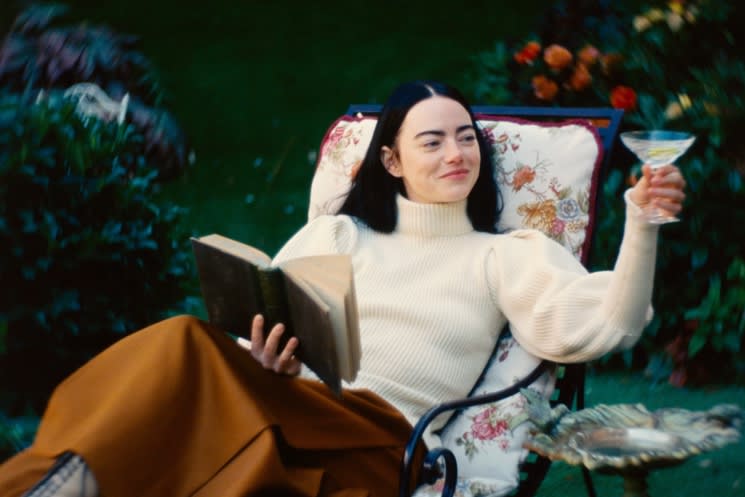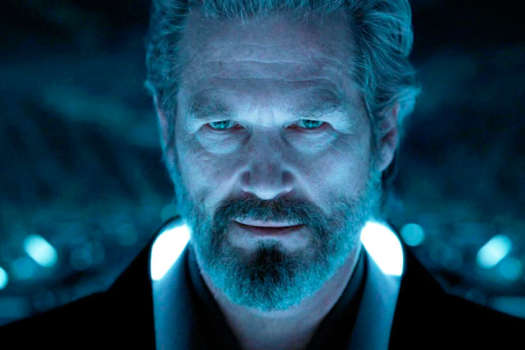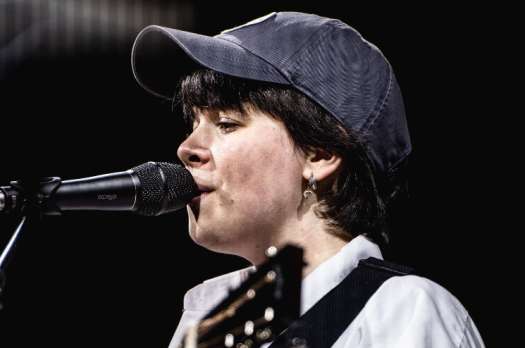I think it's time we start discussing adding Emma Stone and Yorgos Lanthimos to the list of great cinematic collaborations. Only their second film together, Poor Things builds off of the unapologetic brand of humour The Favourite so brazenly presented to audiences in 2018, signalling a (hopefully) enduring combination to be seen for years to come.
In a career-best performance, Stone plays Bella Baxter, the monster to Willem Dafoe's Dr. Frankenstein (Dr. Godwin Baxter in this case, or as Bella calls him, "God"). When we first meet Bella, she's finding her legs and discovering her voice akin to a toddler learning about the world for the first time. Over the course of the film, Bella's faculties mature — she's particularly enlightened by the discovery of sexual pleasure through masturbation and intercourse.
As Bella grows and her universe expands, many are inexplicably and aggressively pulled into her orbit, most notably Duncan Wedderburn (Mark Ruffalo). Intoxicated by Bella, Duncan convinces her to leave God and Max McCandles (Ramy Youssef), God's assistant and Bella's fiancé. The two embark on a journey that sees Bella not only learn social graces and daily luxuries, but also contend with the injustices and hypocrisy of the world.
Adapted from Alasdair Gray's award-winning novel, Poor Things: Episodes from the Early Life of Archibald McCandless M.D., Scottish Public Health Officer, Lanthimos and screenwriter Tony McNamara lean into the satirical nature of the source material while exhibiting a deference to Mary Shelley's classic. Through the unravelling of Bella's innocence, McNamara's script poses questions to the audience that are simple and obvious, but rarely reconciled in our minds. Scathing observations about society are declared with the softest grace and humour, aided greatly by Stone and Ruffalo's turns.
Stone shoulders the weight of the film handily, as the Oscar-winner impressively flows from toddler to mature woman with a paradoxical in-your-face subtlety that's fascinating to examine as an acting exercise. Never playing the fool, Stone instills a sense of respectable curiosity to Bella that invites audiences to forfeit any unnecessary sympathy for the character. Not to be outdone is the physicality Stone brings to the film that elevates the script from biting to a deeply felt experience.
In contrast to Bella's wide-eyed concern for the world, Ruffalo's Duncan delights in being a part of the worst aspects of society. Smug, arrogant and altogether priggish, Ruffalo appears to be having the most fun playing with Duncan, oily accent and all. Acting as the audience's conduit for what our reactions to someone like Bella would truly be, Ruffalo's pure indignation, frustration and all-consuming fixation produces some of the film's most humorous moments.
For as much as the performances have been lauded since the film's premiere in Venice, the technical achievements should be equally commended. Cotton candy-coloured sets evoke an almost bubblegum version of steampunk that works well with the industrial yet whimsical world Lanthimos creates. Tying the entire film together is the intricate and tactile costume design of Holly Waddington, which recalls a mixture of Victorian-era dress sense and the modern-day hipster. Finally, Robbie Ryan's dynamic cinematography cleverly grows with Bella
The film delivers the perfect confluence of technical skill and artistic aptitude that serves as a highlight reel for the entire cast and crew. One of the most compelling and engaging films of the year, Poor Things continues Lanthimos's run as Hollywood's most artistic weirdo.
(Searchlight Pictures)In a career-best performance, Stone plays Bella Baxter, the monster to Willem Dafoe's Dr. Frankenstein (Dr. Godwin Baxter in this case, or as Bella calls him, "God"). When we first meet Bella, she's finding her legs and discovering her voice akin to a toddler learning about the world for the first time. Over the course of the film, Bella's faculties mature — she's particularly enlightened by the discovery of sexual pleasure through masturbation and intercourse.
As Bella grows and her universe expands, many are inexplicably and aggressively pulled into her orbit, most notably Duncan Wedderburn (Mark Ruffalo). Intoxicated by Bella, Duncan convinces her to leave God and Max McCandles (Ramy Youssef), God's assistant and Bella's fiancé. The two embark on a journey that sees Bella not only learn social graces and daily luxuries, but also contend with the injustices and hypocrisy of the world.
Adapted from Alasdair Gray's award-winning novel, Poor Things: Episodes from the Early Life of Archibald McCandless M.D., Scottish Public Health Officer, Lanthimos and screenwriter Tony McNamara lean into the satirical nature of the source material while exhibiting a deference to Mary Shelley's classic. Through the unravelling of Bella's innocence, McNamara's script poses questions to the audience that are simple and obvious, but rarely reconciled in our minds. Scathing observations about society are declared with the softest grace and humour, aided greatly by Stone and Ruffalo's turns.
Stone shoulders the weight of the film handily, as the Oscar-winner impressively flows from toddler to mature woman with a paradoxical in-your-face subtlety that's fascinating to examine as an acting exercise. Never playing the fool, Stone instills a sense of respectable curiosity to Bella that invites audiences to forfeit any unnecessary sympathy for the character. Not to be outdone is the physicality Stone brings to the film that elevates the script from biting to a deeply felt experience.
In contrast to Bella's wide-eyed concern for the world, Ruffalo's Duncan delights in being a part of the worst aspects of society. Smug, arrogant and altogether priggish, Ruffalo appears to be having the most fun playing with Duncan, oily accent and all. Acting as the audience's conduit for what our reactions to someone like Bella would truly be, Ruffalo's pure indignation, frustration and all-consuming fixation produces some of the film's most humorous moments.
For as much as the performances have been lauded since the film's premiere in Venice, the technical achievements should be equally commended. Cotton candy-coloured sets evoke an almost bubblegum version of steampunk that works well with the industrial yet whimsical world Lanthimos creates. Tying the entire film together is the intricate and tactile costume design of Holly Waddington, which recalls a mixture of Victorian-era dress sense and the modern-day hipster. Finally, Robbie Ryan's dynamic cinematography cleverly grows with Bella
The film delivers the perfect confluence of technical skill and artistic aptitude that serves as a highlight reel for the entire cast and crew. One of the most compelling and engaging films of the year, Poor Things continues Lanthimos's run as Hollywood's most artistic weirdo.




